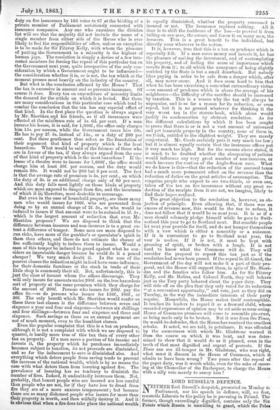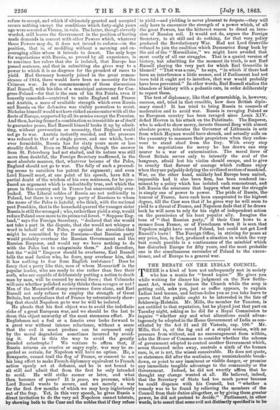LORD RUSSELL'S DEFENCE.
ITHER Earl Russell's despatch, presented on Monday te, Parliament, nor his speech in defence, will, we fear, reconcile Liberals to the policy he is pursuing in Poland. The former, though exceedingly dignified, contains only the Six Points which Russia is unwilling to grant, which the Poles refuse to accept, and which if ultimately granted and accepted secure nothing except the conditions which forty-eight years ago were secured at Vienna, in vain. The latter, though cleverly worded, still leaves the Government in the position of having made demands in concert with other Powers which, whatever those Powers may do, it does not intend to enforce—in the position, that is, of meddling without a meaning and en- couraging allies whom it intends to desert. The only hope for negotiations with Russia, as proved by all experience, is to convince her rulers that she is isolated, that Europe has passed sentence, and that in submitting she gives way to a power to which it is no disgrace for the proudest of races to yield. Had Germany honestly joined in the great remon- strance of 1854, there would have been no necessity for the Crimean war. . In the commencement of these discussions Earl Russell, with his idea of a municipal autonomy for Con- gress-Poland—for that is the sum of his Six Points, even it' honestly conceded—contrived to unite England and France and Austria, a mass of available strength which even Russia and Russia on the defensive was visibly powerless to resist.
Nicholas himself would nothave risked aneneounterwith all the fleets of Europe, supported byall its armies except the Prussian. And then, having framed a combination so irresistible as of itself to guarantee peace, Earl Russell himself broke it up by admit- ting, without provocation or necessity, that England would not go to war. Austria instantly receded, and the pressure was reduced to that of a single power, and one which, how- ever formidable, Russia has for sixty years more or less steadily defied. Even on Monday night, though the answer from St. Petersburg had not started, and its nature was still more than doubtful, the Foreign Secretary reaffirmed, in the most absolute manner, that, whatever became of the Poles, England should not go to war. The folly of such a proceed- ing seems to outsiders too patent for argument; and even Lord Russell must, at one point of his speech, have felt a partial doubt of the wisdom of his own sentences, for he pro- duced an argument which is undoubtedly true, and which the press in this country and in France has unaccountably over- looked. The Liberal nobles of Russia are not unfriendly to Poland, but there is a very large party of Russians to whom the name of the Poles is hateful, who think, with the national poet Poushkin, that in the household quarrel the younger sister Russia is still the wronged ; who, ratherthan yield a step, would reduce Poland once more to its primteval forest. "Suppose Eng- land," says the Foreign Secretary, "declared that she would not take a part in the dispute, that she would not whisper a word in behalf of the Poles, or against the atrocities that might be committed by the Russians—that Russian party would probably overbear the Russian Government and the Russian Emperor, and would say we have nothing to do with the Poles but to exterminate them." And therefore, lest the " mild " Emperor should be overborne, Earl Russell tells the mad faction who, he fears, may overbear him, that it has nothing to fear from English resistance ! Does he fancy that a party like this, men of whom Mouravieff is the popular leader, who are ready to rise rather than free their serfs, who are capable of deliberately putting a nation to death man by man, will be coerced by moral force ; that Calmucks will care whether polished society thinks them savages or not ? Men of the Mouravieff stamp reverence force alone, and Earl Russell not only refuses to employ the strength of Great Britain, but neutralizes that of France by ostentatiously show- ing that should Napoleon go to war he will be isolated.
He pleads that his first object was to avoid the indefinite risks of a great European war, and we should be the last to deem this object unworthy of the most strenuous effort. No Englishman not a fool or a fanatic ever looks forward to a great war without intense reluctance, without a sense that the evil it must produce can be surpassed only by the moral degradation sometimes incurred by avoid- ing it. But is this the way to avoid the greatly dreaded catastrophe ? We venture to affirm that, if Russia returns an evasive or angry reply, war may be re- garded as certain, for Napoleon will have no option. He, a Bonaparte, cannot trail the flag of France, or consent to see his long effort to make French diplomacy equivalent to French action openly set at defiance, and he is not bound to it still and admit that from the first he only intended to scold. He will strike sooner or later, and what then becomes of peace? It is peace, we presume, which Lord Russell wants to secure, and not merely a war for the first few months of which we may keep ingloriously out of the fray. Yet, in this very speech, he gives Russia a direct invitation to do the very act Napoleon cannot tolerate, by showing both to the Czar and the nobles that if they refuse to yield—and yielding is never pleasant to despots—they will only have to encounter the strength of a power which, of all the great Powers, has the bitterest reason to dread an inva- sion of Russian soil. It would not do' argues the Foreign Secretary, to sit still and do nothing, for that very. policy produced the Revolutionary War. Had not Lord Grenville. refused to join the coalition which Dumouriez flung- back by the aid of the " Marseillaise," we might have avoided that most costly of all our struggles. That is a quaint version of history, but admitting for the moment its truth, is not Earl Russell playing the very part for which Earl Grenville is blamed? "That was a case, he says, "in which if there had' been an interference a little sooner, and if Parliament had not been told it ought not to interfere that war would probably have been prevented." In other words, Earl Russell studies the blunders of history with a pedantic care, in order deliberately- to repeat them.
The test of diplomacy, like that of generalship, is, however, success, and, tried in that crucible, how does British diplo- macy stand? It has tried to bring Russia to counsels or moderation and to avoid war. Russia is ravaging Poland as no European country has been ravaged since Louis XIV. defied Heaven in his attack on the Palatinate. The Emperor, who is asked to show mercy, invests General Berg with almost absolute power, tolerates the Governor of Lithuania in acts' from which Haynau would have shrunk, and actually calls on. the peasantry to massacre their proprietors when they endea- vour to stand aloof from the fray. With every step, in the negotiations for mercy he has drawn one step nearer to a war of extermination. The moral force or Great Britain serves only to intensify the zeal of the- hangman, afraid lest his victim should escape, and to give- to cruelty that flavour of courage which ruffians enjoy when they are palpably defying the civilized section of mankind. War, on the other hand, unlikely had Europe been united,, impossible had it also been firm, has been rendered im- minent by a policy which has isolated each remonstrant, and' left Russia the assurance that happen what may the struggle is simply one of power to power. The pride of Russia, the- honour of France, have each been exasperated to the highest degree, till the Czar sees that if he gives way he will seem to- yield to a threat of France' and Napoleon feels that if he draws back he will seem to rely for his right of independent action on the permission of his least popular ally. Imagine the- tone of "that Russian party,' if their Czar bows to a- menace from France, or of Frenchmen when it is seen that Napoleon might have saved Poland, but could not get Lord. Russell's leave ! The Foreign Office, in striving for peace at any price, has, in fact, produced a situation in which the very best result possible is a continuance of the mischief which has disturbed Europe for fifty years, and the most probable. one is the simultaneous surrender of Poland to the execu- tioner, and of Europe to a general war.































 Previous page
Previous page